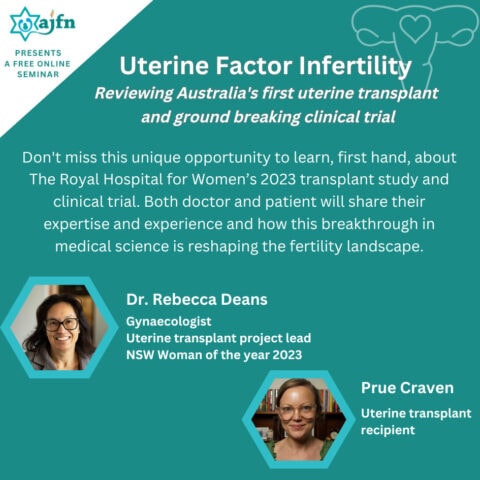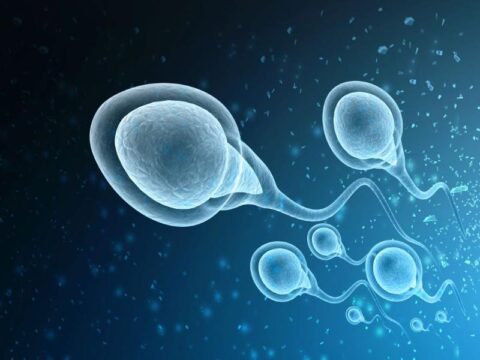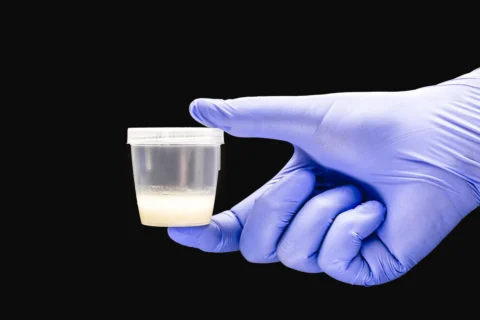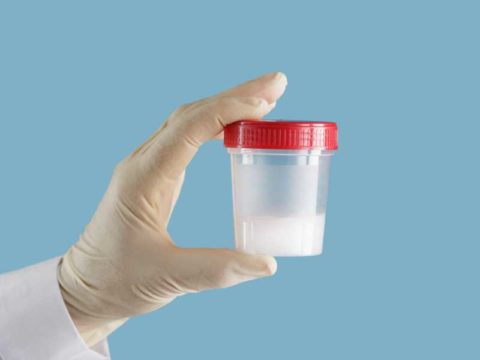Our program adheres to the practices developed by the Reproductive Technology Accreditation Committee (RTAC) of the Fertility Society of Australia (FSA), the National Health and Medical Resource Council (NHMRC) Ethical Guidelines, the 2007 NSW Assisted Reproductive Technology Act and the 2009 Regulations of this Act and the 2004 ACT Parentage Act.
At the heart of our donor program, is a focus on the future welfare of any child born from donor sperm. Any medical and counselling information provided before treatment will always take into account the best interests of the future child.
The purpose of this booklet is to explain the preparation process involved in becoming a known or de-identified sperm donor.
What is sperm donation?
Sperm donation refers to the use of sperm, which has been donated by a third person or ‘donor’ to assist an individual, couple, or family known as recipient(s), in their attempt to have a child.
Types of donors
Donors are classified as either known or de-identified depending on the type of relationship between the donor and recipient(s).
De-identified sperm donation is where the identity of the donor is not known to the recipient(s) at the time of treatment, although identifying information will be made available for access by the child once they reach 18 years of age. De-identified donors are recruited locally by IVFAustralia or through partnerships with international sperm banks. The donated sperm is available for treatment to any IVFAustralia patient and can be used to create up to five families.
Known sperm donation is where the identity of the donor is usually known to the recipient(s) and commonly where the donor and recipient have an existing relationship. A known donor may be a friend, family member or have been privately recruited. The donated sperm is only used for the treatment of one specific family.
Eligibility criteria for a known donor
You may be eligible to be a known sperm donor provided you:
- Are not under the age of 21
- are not a close relative of the recipient being treated
- are not from a younger generation of the recipient(s)
- do not have a past or current history of significant mental health problems
- do not have a significant medical condition yourself or in your family that may be passed onto future children
- do not have any infectious conditions that may be passed onto the recipient of the donation
For medical reasons we do not encourage known donors who are over 50 years of age. However, the recipient(s) may have a strong or very sound reason for choosing a particular known donor and we will discuss the implications of that donor on an individual basis.
Eligibility criteria for a de-identified donor
You may be eligible to become a de-identified sperm donor provided you:
- are not under 21 years of age or over 45 years of age
- have not previously donated sperm to another family
- do not have a past or current history of significant mental health problems
- do not have a significant medical condition yourself or in your family that may be passed on to future children
- do not have any infectious conditions that may be passed onto the recipient of the donation
The legal framework
In Australia all sperm donors are required to make their identity available to the children conceived from their donation when the child turns 18 years of age.
All de-identified donors recruited by IVFAustralia, either in NSW or the ACT, must give written informed consent for their identifying information to be added to the NSW Health ART Central Register, if a child is born from their donation.
In the case of a known donor, where donation and treatment occurs in the ACT, there is no requirement for their name to be added to the NSW Register as this is a NSW requirement only. However, the donor is still required to consent to their identifying information being released to any donor offspring after the age of 18 years.
For more information about what details are added to the NSW Health ART Central Register please go to the NSW Health website health.nsw. gov.au/art
Sperm donors are only allowed to create a maximum of five families worldwide including the family/s of the donor. All overseas donors are required to meet the same legislative requirements.
Sperm donors have no legal or financial obligation to any child born from their donation. A child born from donated sperm is deemed to be the child of the recipient(s) and the recipient(s) put their name on the birth certificate. As a parent, the recipient(s) have the same rights and obligations as other parents.
Sperm donation is a specialised and sometimes complex area of the law. If you have any concerns in this regard, you should seek your own legal advice.
Can sperm donors be paid?
No. It is illegal in Australia to receive or make any type of payment for human tissue including donated sperm. However, donors can be reimbursed for reasonable expenses incurred during the process of donating, for example travel and medical costs.
Withdrawal of consent of the donor
Donors can withdraw consent at any time to any future use of their sperm. This will be discussed with you in counselling.
Preparation of sperm donors
At IVFAustralia we follow a careful process of preparation for sperm donation to try and prevent any potential genetic conditions or infectious diseases being passed onto the recipient or any children conceived.
This preparation has a number of important steps. The full process for this is shown in the step by step charts on pages 10 and 11.
If during the assessment process information arises that would have serious implications for the health of either the recipient or any children, the donor must give written consent for this information to be provided to the recipient(s), otherwise it may not be possible for the donation to proceed.
Sperm donation is a generous gift however sometimes it may become apparent during the assessment process that a person is not suitable to be a sperm donor. If this arises, the issues will be discussed with the donor first and they will not be able to proceed with the donation.
1. Consultation with a fertility specialist
Your fertility specialist will take a comprehensive medical history and arrange some tests to ensure you are suitable to be a donor. During this consultation you will receive an overview of the preparation and treatment process.
2. Blood and sperm tests
Donors undergo blood and urine tests to exclude infectious diseases and genetic conditions that might be passed onto the recipient or child. A semen analysis will also be conducted to check the quality of your sperm and help us understand what treatment it will be most suitable for, to help achieve a pregnancy.
3. Implications counselling
Donors are required to undergo counselling to consider all aspects and implications of becoming a sperm donor. If you are currently in a relationship your partner must also attend counselling.
Your counsellor is required by the current legislation and RTAC guidelines to demonstrate that potential donors and recipient(s) have discussed and understood a range of topics relevant to the welfare of any potential child created from donation.
Implications counselling will explore your motivations for donating, the implications of donation for you and your family, your expectations for future exchange of information, the legal framework and the psychological implications of sperm donation.
4. Genetic testing & family history
You will be asked to gather information about your family medical history. This will carefully document your genetic background so that if a child born from your donation has health problems in the future, they have access to a full account of their genetic history.
A genetic counsellor will review your family history & genetic test results and if relevant discuss with you the inheritable patterns of any potential disorders and assess the chances of a child born, being affected with those disorders.
The genetic counsellor will also discuss with you specific tests performed as a part of the donor assessment process. De-identified donors will undergo a preconception screen which determines your carrier status for 590 diseases. This screen covers genes known to cause diseases in early childhood including cystic fibrosis, adrenal hyperplasia, adrenoleukodystrophy and phenylketonuria. For known donors the preconception screen is optional, however a cystic fibrosis test will be required.
Some further genetic tests may be needed in some ethnic groups (eg. Ashkenazi Jews) and, if these are necessary, the genetic counsellor will explain this to you.
Please note that information may arise as a result of this process that can have important consequences for yourself and your own family. In this case expert advice and support will be provided in considering the long term implications.
5. Sample collections
For a de-identified sperm donor, we normally ask the donor to collect 10-12 separate sperm samples. This allows enough samples to allow up to 5 families to be created with their chosen donor. We ask that these samples are collected on site at one of our clinics.
If you are a known donor, we normally aim to collect 3-4 separate sperm samples. Sometimes, more samples will be required. This will require multiple visits to the clinic to make the donations.
6. Quarantine period
It is an Australian requirement that donated sperm be quarantined for a three month period. The donor is tested for infectious diseases at the time of donation and then again three months after the final collection before the sperm can be released for treatment. Tests include HIV, hepatitis B, hepatitis C, Syphillis, chlamydia, gonorrhoea and human lymphotropic virus (a rare cause of cancer of the lymph nodes). We understand there are many appointments, so where possible we try and group appointments together to make it more convenient for you.
Exchange of information for de-identified donors
What non-identifying information are the recipient(s) and children entitled to know?
We are required to provide the following non-identifying information:
- Relevant medical and family history summary
- A questionnaire completed by the donor (eg. eye colour, personality traits, education, ethnicity etc)
- Genetic questionnaire
- Number of other families & children conceived by that donor
Any other information about the donor given to the recipient(s) and children is dependent on the consent of the donor. Once a donor conceived child turns 18 years of age, they can then access the donor’s identifying information via the NSW Health ART Central Register or through IVFAustralia.
What information are de-identified sperm donors entitled to know?
De-identified sperm donors are only entitled to non-identifying information about the recipient families and any children born. On request to the clinic, a sperm donor is entitled to be told about the number, gender, and the year of birth of children born to each family using their donation but will not be given any further information without the consent of the recipient(s) of the donation.
If both donor and recipients(s) consent, it is possible for the voluntary exchange of information, according to the wishes of each party. This is usually driven by the child once they become aware they are donor conceived.
Known sperm donor preparation
| Phone clinic | |
| Medical consultation | Takes your medical history Discusses donation process Assesses eligibility |
| Donor coordinator | We will call to discuss the work up process for donation and plan appointments |
| Semen analysis and screeningtests | Semen analysis is conducted and blood screening tests for infectious and genetic diseases |
| Implications counselling | Usually 2 individual sessions and a joint session with your recipient to consider the legislation and implications of donation |
| Genetic review | Genetic review Review family medical history Explain genetic tests as required |
| Sperm freeze | Your donor coordinator will arrange dates to freeze your sperm |
| Quarantine period for sperm | Your samples are quarantined for 3 months priorto being released for treatment |
| Repeat blood tests | After quarantine completion, we will contact you to have your blood tests repeated |
| Medical review | Donation can now be released for access by recipient |
De-identified sperm donor preparation
| Phone clinic | |
| Donor coordinator | We will call you to arrange medical consultation, counselling and screening tests |
| Medical consultation | Takes medical history Discusses donation process Assesses eligibility |
| Semen analysis and screening | Semen analysis conducted and blood screening tests for infectious and genetic diseases |
| Implications counselling | To consider the legislation and implications of donation for you and your family |
| Genetic review | Review family medical history Explain genetic tests as required |
| Sperm freeze | Your donor coordinator will arrange dates to freeze your sperm |
| Quarantine period for sperm | Your samples are quarantined for 3 months prior to being released for treatment |
| Repeat blood tests | After quarantine completion, we will contact you to have your blood tests repeated |
| Medical review | The Medical Director signs off that your donation is ready to be released |
| Follow up | Donor coordinator calls once a year to update your contact information and any changes to your medial history. You can ask about your donation outcomes. |
Source: IVF Australia: Becoming a Sperm Donor, ivf.com.au ◆ 1800 111 483





